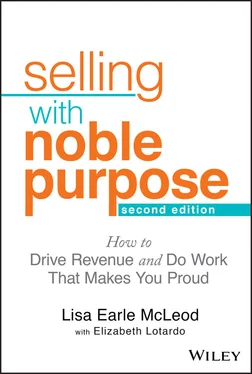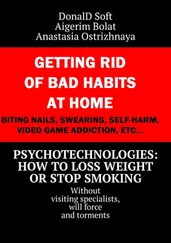We are experiencing a reset like never before. Business norms are being challenged, and teams are being called upon to innovate, reinventing what they sell and how they sell on daily basis. A growing chorus of customers are asking: Is your sales team here to help me? Or are they just trying to close me?
Here's what we know to be true: amid disruption, one thing that can keep a salesforce motived and committed to delivering the highest results is a sense of purpose.
The teams you'll read about in this book use their purpose as a North Star to guide them during times of uncertainty and unrest. Purpose enables them to make quick decisions and to put their highest ideals into action.
Over the last five years, purpose has become a hot topic in business. Organizations proudly announce their purpose across social media. Leaders talk about their purpose during the annual meeting. Yet what the COVID crisis has revealed with stark clarity is that purpose must be more than a mantra or management technique: during disruption, purpose is a lifeline to your customers and your team.
The core idea of this book is that sales teams with a noble purpose bigger than money—whose aim is to improve life for customers—outsell transactional teams who focus on internal targets and quotas. During a crisis, the contrast between transactional sellers and noble purpose sellers is on display.
It's long been assumed that sales teams are primarily driven by economic incentives alone—when in fact, nothing could be further from the truth.
We stand in a place and time where the role of business in the world is being questioned. The pressure for short‐term profit is a constant, yet there is equally forceful pressure to do right by our people and customers and make the workplace more meaningful for all. Sales is where money and meaning come together. It's time for us to harness the fierce urgency of now to transform the way we conduct business and restore nobility to the sales profession.
The Curbside Conversation Where Selling with Noble Purpose Was Born
A decade ago, I was part of a consulting team asked by a major biotech firm to conduct a six‐month double‐blind study of its sales force. The purpose of the study was to determine what behaviors separated top salespeople from average ones. The study revealed something no one expected: the top performers all had a far more pronounced sense of purpose than their average counterparts.
The salespeople who sold with Noble Purpose—who truly wanted to make a difference to customers—consistently outsold the salespeople who were focused on sales goals and money.
It was a startling discovery that I might have missed, had it not been for a curbside conversation at the Phoenix airport.
I was finishing a two‐day ride‐along with a sales rep. As she dropped me off at the airport, I asked her a question I hadn't asked the other reps: “What do you think about when you go on sales calls? What's going on in your head?”
“I don't tell this to many people,” she confessed, looking around the car as though someone was going to hear her secret. “When I go on sales calls, I always think about this particular patient who came up to me one day during a call on a doctor's office.
“I was standing in the hallway, talking to one of the doctors. I was wearing my company name badge, so I stood out. All of a sudden, this elderly woman taps me on the shoulder.”
“‘Excuse me, Miss,” she said. ‘Are you from the company that makes this drug?’ pointing to a pamphlet on the counter.
“‘Yes, ma'am,” I replied.
“‘I just want to thank you,’ she said. ‘Before my doctor prescribed your drug, I barely had enough energy to leave the house. But now I can visit my grandkids; I can get down on the floor to play with them. I can travel. So thank you. You gave me back my life.’”
The sales rep told me, “I think about that woman every day. If it's 4:30 on a rainy Friday afternoon, other sales reps go home. I don't. I make the extra sales call because I know I'm not just pitching a product. I'm giving people their life back. That grandmother is my higher purpose.”
Sitting in that blistering Phoenix heat, I realized she had said something incredibly important. I thought about that conversation during my entire flight back to Atlanta. I kept turning it over and over in my head.
Our consulting team had spent months shadowing salespeople all over the country. We'd conducted in‐depth interviews and analyzed every aspect of the sales calls. But this was the first time anyone had opened their heart and spoken in an authentic, emotional way about what truly moved them. While others had spoken in corporate platitudes, here was a salesperson speaking the language of the soul.
Was this what spelled the difference between average performers and top performers—this seemingly esoteric construct; this thing called purpose ?
Keep in mind: this was 10 years ago. At that time, the conversation about meaning and purpose at work was the realm of ministers and non‐profits. Yet here I was in a corporate setting, and I knew I had spotted something important. I went back to the transcripts of the interviews, looking for purpose. I didn't see it at first. Then I looked closer—and there it was, in the rep who said, “My dad was a doctor. Doctors have an even harder job than most people realize. I want to make it easier for them.”
It was there in the rep who was thrilled to be discussing the science, and who practically glowed when he said, “Isn't it amazing the way that we're able to do these things?” There were other reps who spoke about the impact they had on nurses and patients. Although none of these people actually used the word purpose , the essence was there.
At the end of the project, the client asked us to look across all the reps and identify who we thought were the top performers. It was a double‐blind study, so the other consultants and I didn't know who was at the top and who was just average.
I had found five representatives who conveyed a sense of purpose in the interviews. I told the client, “I think these five are top‐performing salespeople.”
Every single one was correct. And the rep in Phoenix who went on sales calls thinking about the grandmother? She was the number‐one salesperson in the country three years running.
Imagine the scene: a science‐based firm with commercial endeavors around the globe. The leadership team is largely doctors, scientists, and MBAs. They've gathered around an impressive marble conference table to hear the results of the extensive sales study. I have now just seemingly magically identified the top sales performers without knowing any of their sales numbers. Of course, the next question is pretty obvious.
“How did you know?” they asked, looking at me as if I was some kind of wizard.
The answer I came up with left something to be desired. The best way I could describe it at the time was to say, “The top performers have a different story in their hearts.” It sounded fuzzy.
It was fuzzy. I could tell it wasn't resonating. I (painfully) elaborated, “It's like they're being guided by something more noble.” Still blank stares.
The senior leadership team was looking for something more concrete. I knew I was seeing something , something that went beyond the traditional business approach. It was deeper, and it was real. I remember thinking to myself, if we can bottle this, we can create magic.
That initial study revealed what larger research projects would later validate: The top performers weren't driven solely by money. They were driven by purpose.
Ironic, isn't it? The salespeople who cared about something more than just money wound up selling more than the salespeople who were focused only on quota. Years of client work and several research studies later, the findings leave no doubt: a Noble Sales Purpose (NSP) is the difference between a sales force that is merely adequate and one that's truly outstanding.
Читать дальше












